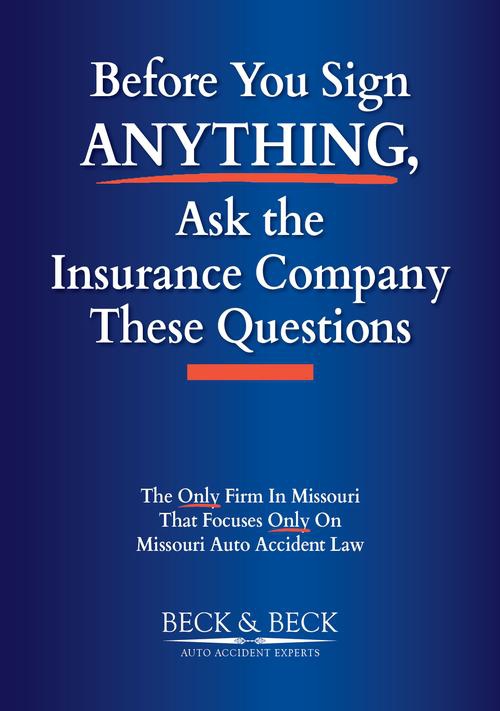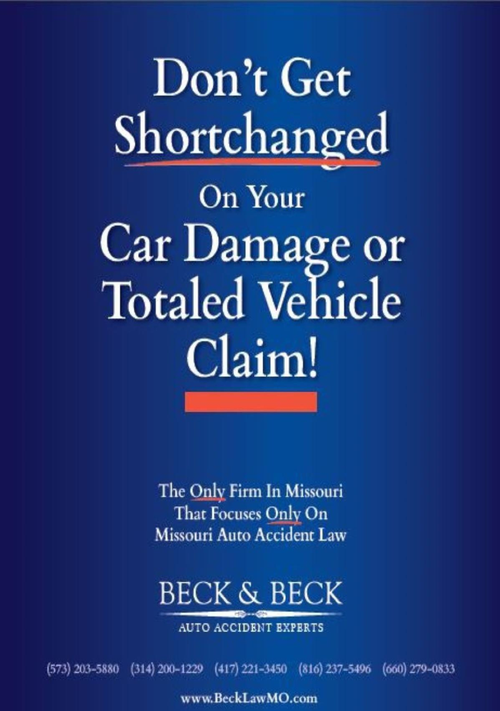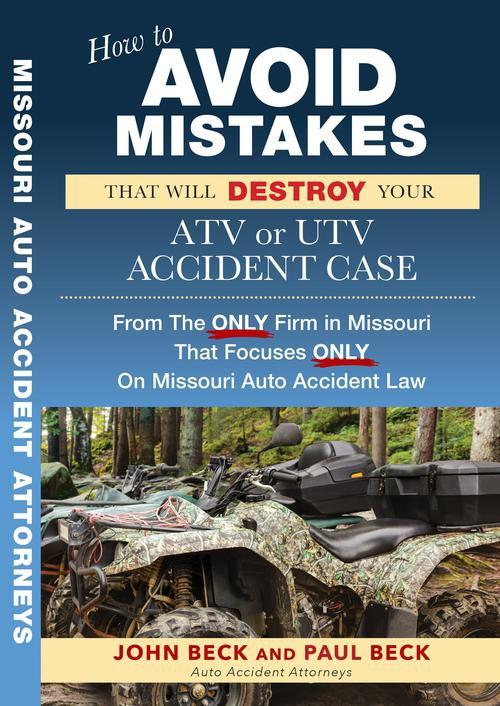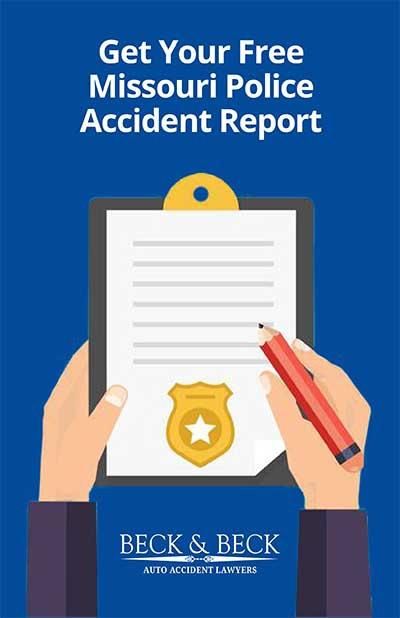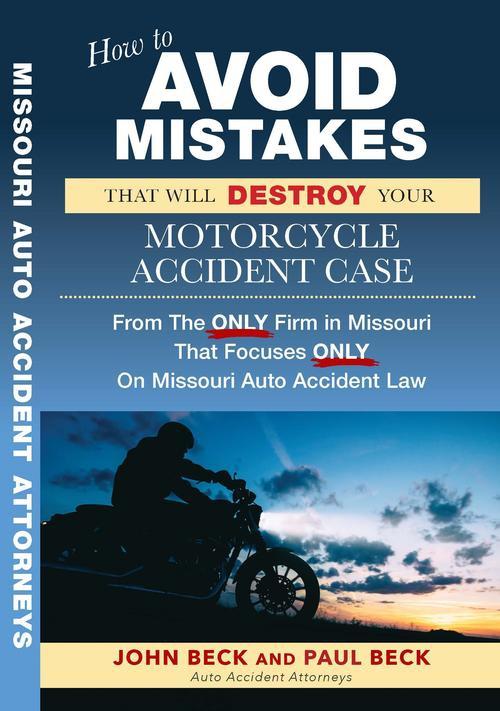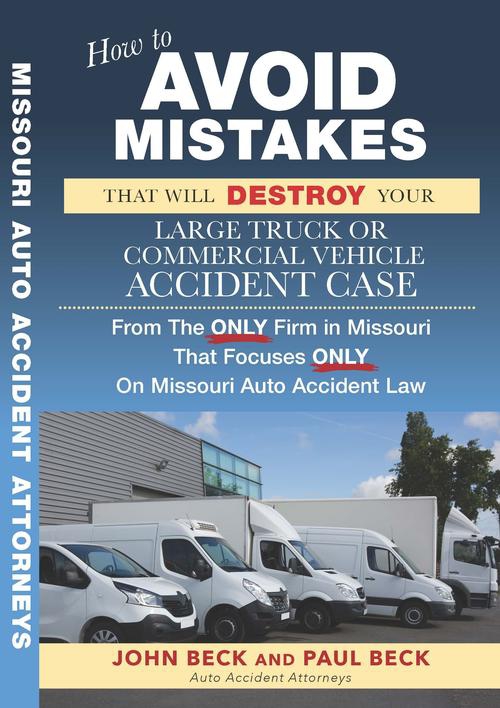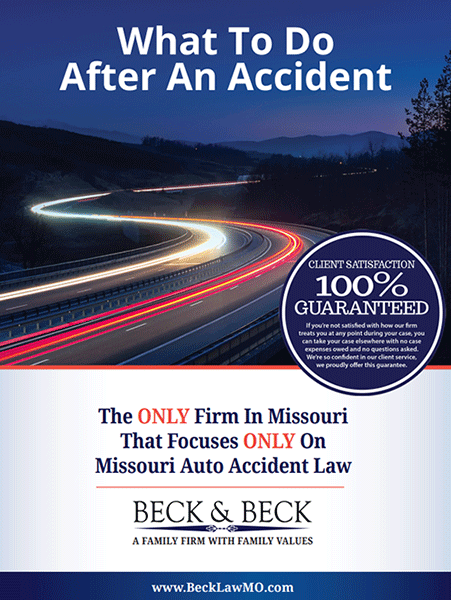When your car is totaled in an accident where you weren’t at fault in Missouri, the aftermath can feel overwhelming. Not only are you left dealing with the loss of your vehicle, but you also have to navigate the insurance claims process to ensure you’re fully compensated for your damages.
In these situations, the at-fault driver’s insurance should cover the cost of your losses. However, insurance companies often aim to minimize payouts, leaving you to fight for the compensation you deserve. Understanding how to handle a “car totaled, not-at-fault” claim is critical to protecting your financial interests.
Filing a claim promptly with the at-fault driver’s insurance is the first step toward resolving the issue. Providing thorough documentation, including repair estimates, proof of the car’s value, and any out-of-pocket expenses, will strengthen your case. Additionally, knowing your rights can help you avoid common pitfalls, such as the undervaluation of your vehicle or low settlement offers.
While the process can be stressful, taking steps after a crash ensures you’re better equipped to handle a totaled car situation. From understanding how your car’s value is calculated to pursuing fair compensation, a strategic approach can make all the difference in getting back on the road.
For immediate legal assistance from an experienced Missouri car accident lawyer, contact our law firm today. We offer free consultations and can help you understand your rights after an accident or injury.
What is Missouri’s Total Loss Threshold, and How Do I Know if My Car is Totaled?
Understanding whether your car is considered a total loss in Missouri starts with knowing the state’s total loss threshold. Missouri law sets this threshold at 80% of the vehicle’s fair market value before the accident. This means that if the cost to repair your car exceeds 80% of its pre-accident value, it is classified as a total loss.
To determine your car’s fair market value, insurers typically reference resources like Kelley Blue Book or similar valuation tools. They may also consider your car’s mileage, condition, and custom modifications or upgrades. If your vehicle is under six years old and repair costs surpass the 80% threshold, your insurance company must legally compensate you for its value before the crash.
What Happens When Your Car is Totaled?
As we mentioned, when a vehicle is declared a total loss, the at-fault driver’s insurance company is responsible for providing enough funds for you to replace it. However, insurers may dispute whether your car meets the total loss threshold to minimize payouts. This is a common tactic, as insurance companies prioritize profits over fully compensating claimants.
Document your car’s condition and value before the accident to ensure a fair settlement. Include photos, maintenance records, and receipts for upgrades or replacements. These details can help counter any undervaluation attempts by the insurance adjuster.
If you believe your car qualifies as a total loss, but the insurer disagrees, understanding Missouri’s total loss laws and seeking professional advice can help you fight for compensation. You can protect your financial interests and move forward after the accident with the proper steps.
How is The Value of a Totaled Car Determined?
When your car is declared a total loss, the insurance company calculates its actual cash value (ACV)—the vehicle’s pre-accident market value, considering depreciation. This amount often differs from the original purchase price, as it accounts for factors like mileage, wear, and market trends. You can expect the ACV to be a settlement if you have comprehensive or collision coverage.
Critical Factors in Determining ACV
Insurance companies rely on third-party valuation tools and adjusters to estimate your car’s ACV. Here are the main elements they consider:
• Damage Severity: The extent of damage plays a crucial role. The car is declared totaled if repair costs exceed the total loss threshold.
• Age of the Vehicle: Older cars typically have lower values, and if replacement parts are scarce, insurers are more likely to declare them total losses.
• Make, Model, and Trim Level: The car’s brand, model, and specific features significantly affect its value. A luxury vehicle or a higher trim level usually has a higher ACV.
• Salvage Value: Insurers calculate the potential recovery from selling the damaged vehicle to a salvage yard. This amount impacts their decision to declare a total loss.
What If You Disagree with the Valuation?
If you believe the insurer undervalued your vehicle, you have options. Start by providing evidence like maintenance records, recent upgrades, or an independent appraisal. You can also request a review by a state-appointed authority or seek legal advice from Beck & Beck Missouri Car Accident Lawyers if necessary.
What if The Value of My Car is More Than The Insurance Company Estimated?
When the insurance company’s offer undervalues your car, you don’t have to accept it. Negotiation is a critical step to ensure you receive a fair settlement. Here’s how you can approach the process:
1. Determine Your Car’s True Value
Start by researching your car’s actual cash value (ACV). Use trusted resources like Kelley Blue Book or Edmunds to assess its worth based on make, model, mileage, and condition. Obtain estimates from multiple mechanics, including one you trust, to compare repair costs. Armed with this data, you’ll have a solid foundation for challenging the insurance adjuster’s valuation.
2. Negotiate Effectively with the Insurance Company
Once you’ve gathered evidence, present your findings to the claims adjuster. Politely ask them to justify their initial offer and carefully analyze their reasoning. If their valuation doesn’t align with your research, counter your evidence. Have a desired settlement and the minimum amount you’re willing to accept.
If the adjuster insists on a lower payout, consider requesting a written evaluation from an independent appraiser or involving your state’s insurance regulatory body to review the offer.
3. Confirm the Agreement in Writing
Once you’ve reached an acceptable settlement, ensure the agreement is documented. The written record should outline the payout amount and specify any conditions, such as repairs or replacement terms.
Hiring an experienced attorney can help secure a more favorable outcome if negotiations become too challenging or the stakes are high. By preparing thoroughly and advocating for your position, you can maximize your settlement and receive the compensation you deserve.
What If My Car Hasn’t Been Paid Off Yet?
If your car is totaled in an accident but hasn’t been fully paid off, the financial implications can add to the stress of losing your vehicle. Here’s how this situation typically unfolds and what you can do about it.
Understanding Loan vs. Insurance Payout
The amount you owe on your car loan may not match the insurance payout for your totaled vehicle. The insurer will typically pay the car’s actual cash value (ACV), which considers depreciation. If the ACV exceeds your loan balance, you can pay off the loan and use any leftover funds toward a new car.
However, you’re still responsible for covering the difference if the loan amount exceeds the payout. This means you’ll need to continue making loan payments until the balance is paid off, even though the car is no longer usable.
How Gap Insurance Can Help
“Gap” insurance is specifically designed to address this situation. It covers the difference between the insurance payout and the remaining loan balance, preventing you from being stuck with debt for a car you no longer have. If you have gap insurance, contact your insurer to file a claim.
Steps to Take If You Don’t Have Gap Insurance
If you lack gap insurance, you still have options:
Negotiate the Payout: Ensure the insurance company’s valuation accurately reflects your car’s value.
Discuss Loan Restructuring: Contact your lender to explore payment plan adjustments or refinancing options to manage the remaining balance.
While the situation can be challenging, understanding your options and taking proactive steps can help you manage your financial obligations effectively.
Who Pays For Damages When Your Car is Totaled in a Missouri Car Accident?
When your car is totaled in a Missouri car accident, determining who pays for the damages depends on the circumstances of the crash, including fault and insurance coverage. Here’s a breakdown of how these situations typically play out:
If the Other Driver is At Fault
Missouri follows an at-fault system for car accidents. This means the driver responsible for the crash—or their insurance company—is usually liable for your damages. If the other driver is at fault, their property damage liability insurance should cover the cost of your totaled vehicle based on its actual cash value (ACV).
If Fault is Disputed or You Are At Fault
If there is uncertainty about who caused the accident, you can rely on your collision coverage to pay for the damages. Collision coverage, a separate component of your insurance policy, will cover the damage to your car regardless of fault.
If it is later determined that the other driver was at fault, your insurance company may seek reimbursement from their insurer through subrogation.
If the At-Fault Driver is Uninsured
If the at-fault driver doesn’t have insurance, your uninsured motorist coverage can cover your losses. Missouri requires uninsured motorist insurance for bodily injuries, but you must opt for additional property damage coverage.
What Happens When the Car is Declared a Total Loss?
If your car is deemed a total loss, the insurer will calculate its ACV and issue a payment. In exchange, you’ll typically need to sign over the car’s title to the insurance company. This process ensures you receive compensation, even if the vehicle is no longer drivable.
Understanding your coverage and Missouri’s at-fault laws can help you navigate this process and secure the compensation you deserve.
How is Fault Determined in a Car Accident Claim in Missouri?
Fault is a critical factor in Missouri car accident claims, as it determines which party is legally and financially responsible for the resulting damages. In Missouri, which operates under a comparative fault system, the fault is assessed to decide the degree to which each party contributed to the accident.
Gathering Evidence to Determine Fault
To establish fault, a thorough investigation of the accident is necessary. The following types of evidence often play a significant role:
• Police Reports: Officers responding to the scene document their observations, assign fault when appropriate, and may cite traffic violations.
• Photographs and Videos: Photos of vehicle damage, skid marks, and the accident scene, as well as footage from traffic or dashboard cameras, can reveal how the collision occurred.
• Eyewitness Testimony: Statements from bystanders or other drivers can provide valuable perspectives on what happened.
• Expert Analysis: Accident reconstruction specialists may analyze vehicle positions, road conditions, and other factors to determine fault.
Proving Fault in a Claim
To recover damages, you must show the other party was negligent. This involves proving they breached their duty of care—for example, by speeding, running a red light, or driving while distracted—and that this directly caused the accident and your injuries.
Fault determination requires careful evaluation of all available evidence. By building a solid case, you can protect your rights and seek fair compensation for your losses.
What if the Other Driver Blames Me for the Accident?
Being blamed for an accident can be overwhelming, but Missouri’s pure comparative fault laws ensure that even if you share some responsibility, you’re not automatically disqualified from seeking compensation. Missouri’s system allows you to recover damages proportionate to the other party’s fault.
How Comparative Fault Works
Under the pure comparative fault rule, each party is assigned a percentage of responsibility for the accident. This percentage directly impacts how much compensation you can recover.
For instance, if you’ve found 25% at fault and the total damages amount to $20,000, your recovery will be reduced by 25%, leaving you eligible to receive $15,000. Even if you’re more than 50% at fault, you can still recover compensation for the percentage of damages caused by the other driver.
Insurance companies may attempt to assign you a higher percentage of fault to reduce their payouts. This is why having legal representation can be crucial. A skilled and experienced lawyer can negotiate with insurers, ensure your rights are protected, and work to minimize your percentage of fault.
Missouri’s comparative fault system offers fairness by acknowledging that accidents often have shared responsibility. If the other driver blames you, stay calm, gather evidence, and consider legal guidance to ensure your story is heard.
Tips for Handling the Insurance Company After a Car Accident
Dealing with an insurance company after a car accident can be overwhelming if you’re injured or facing property damage. To protect your rights and ensure a fair settlement, follow these tips:
• Report the Accident Promptly: : Immediately notify your insurance company about the accident. Most policies have a reporting timeframe, so don’t delay.
• Stick to the Facts: : When speaking with the insurance company, provide basic details like the accident’s date, time, and location. Avoid admitting fault or making assumptions about liability.
• Document Everything: : Keep a record of all communications with the insurance company, including phone calls, emails, and letters. Note down the names and positions of the people you speak to.
• Be Cautious with Statements: : Insurance adjusters may ask for a recorded statement. Politely decline until you’ve consulted with an attorney, as these statements can be used to minimize your claim.
• Avoid Accepting the First Offer: : The first settlement offer is often lower than you deserve. Review the offer carefully and consult with an attorney to evaluate its fairness.
• Provide Strong Evidence: Submit clear and organized evidence, such as photos of the accident scene, repair estimates, medical records, and police reports.
• Understand Your Policy: : Review your insurance policy to understand your coverage limits and benefits, including collision, comprehensive, and uninsured motorist coverage.
• Consult an Attorney: : Insurance companies aim to settle claims quickly and for as little as possible. A lawyer can help negotiate on your behalf and maximize your compensation.
By staying organized, cautious, and informed, you can handle the insurance process effectively and protect your rights.
Experienced Missouri Car Accident Lawyers
After a car accident that leaves your vehicle totaled, dealing with insurance companies and navigating the legal system can feel overwhelming. Our team at Beck & Beck Missouri Car Accident Lawyers understands how stressful this time can be and is here to help you fight for the compensation you deserve.
With decades of experience handling car accident claims, our legal team is committed to providing personalized support and aggressive representation. Our attorneys take the burden off your shoulders by managing every aspect of your case so that you can focus on your recovery.
When you work with our law firm, we will:
• Thoroughly investigate your accident to determine fault and gather crucial evidence.
• Consult with experts, such as accident reconstructionists, to strengthen your claim.
• Handle all communication with the insurance company and negotiate a fair settlement.
• Provide clear answers to your questions and guidance at every process step.
• Take your case to court if the insurance company refuses to offer the compensation you deserve.
At Beck & Beck Missouri Car Accident Lawyers, we are committed to securing the best possible outcome for our clients. If you or a loved one has been in a car accident, contact us today for a free consultation and let us fight for your rights.
Our legal team serves the entire state of Missouri and have helped residents in cities such as St. Louis, Florissant, Kirksville, Springfield, Kansas City, Missouri, and more.

